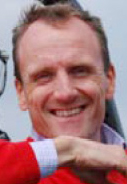Sidney Dekker, Ph.D.
Professor
School of Communication, Humanities and Social Sciences
Griffith University
170 Kessels Road
N16 Macrossan Building, Room 2.21
Nathan Campus, 4111 Queensland, Australia
Honorary Professor, School of Psychology, The University of Queensland
Phone: +61 – 7 – 37354842
Email: s.dekker@griffith.edu.au
Web: sidneydekker.com
Sidney was born near Amsterdam in the Netherlands. He studied psychology at the University of Nijmegen and Leiden University and earned his PhD in Cognitive Systems Engineering from The Ohio State University in 1996. Since then, he has gained worldwide acclaim for his work on human error and safety. Sidney is currently Professor in the School of Communication, Humanities and Social Sciences at Griffith University in Brisbane, Australia. Previously at Lund University in Sweden, he founded the Leonardo da Vinci Laboratory for Complexity and Systems Thinking and also learned to fly the Boeing 737NG. He worked as part-time airline pilot for a company out of Copenhagen, Denmark. Sidney has lived and worked in seven countries and speaks several languages.
Sidney’s work has taken him into the aftermath of many accidents and adverse events over the past two decades—in worlds ranging from healthcare to aviation to shipping and more. Post-accident discourses are dominated by Newtonian-Cartesian views of the world. Stakeholders seek a proportionality between cause and effect (a big disaster must have been preceded by a monumental mistake), hunt for a broken component (human or machine), and argue that data in the world should have made it into somebody’s head, but didn’t, even if it could have prevented the accident. “Justice” in the aftermath of accidents is in the hands of those who determine the official narrative of what happened. Surviving practitioners (“second victims”) almost always lose out. It seems as if we mistake the institutionally legitimated epistemological question of “what happened” with a much deeper existential question of why we, or others, suffer—and desire a simple, satisfying answer.
In his books, Sidney advocates for a diversity of narratives in the aftermath of failure—narratives that cannot be reduced to one another, that help in the creation of diversity and resilience, and that deny the sort of official “truth” that turns everyone else into a liar.

